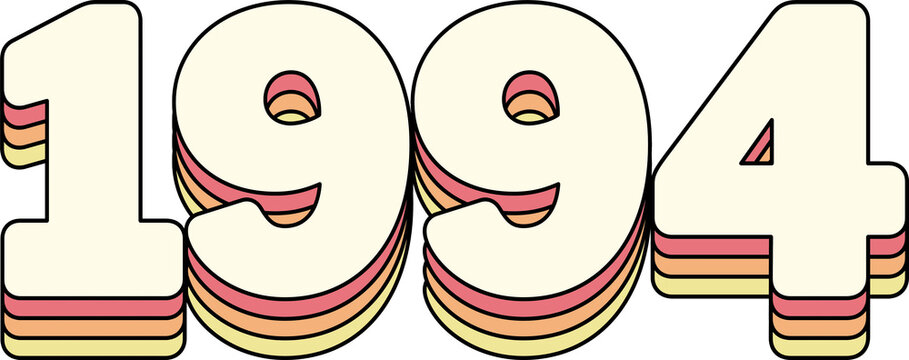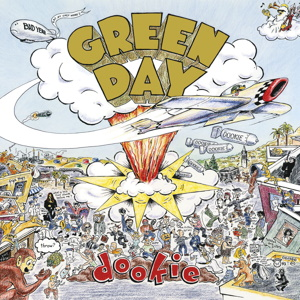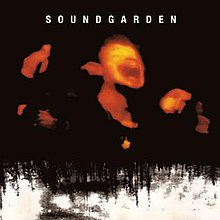1994: a compendium of albums turning 30 in 2024 (part 1)
a collaborative effort celebrating the great albums of 1994

90s nostalgia is so great that it feels sometimes that the decade is still with us in a way, so it's sort of hard to fathom that the 90s were thirty years ago. The passage of time fucks with us all, and nothing brings that fuckery harder than looking back at the media you consumed years ago, especially music.
Music has a way of taking us back. We remember where we were when we first heard a favorite album. We have memories of dancing to specific songs, of crying over lyrics that hit home, of having your first real kiss while Steely Dan was playing softly in the background. We mark the milestones of these songs and albums the way we mark our own birthdays. They are time capsules, but they are actually time itself, knocking on our doors, here to remind us that life is fleeting and we better grasp all that is good while we can.
Thirty years ago I had two children under four. Those kids are 34 and 31 now and time seems remarkably strange to me. It could have been only ten years ago they were watching Power Rangers and learning to read, but no, it was so much longer than that. I can't grasp that sometimes.
1994 was an incredible year for music and looking at some of the albums that are turning thirty this year is like walking your mind through a museum. I view a lot of these records with a sort of reverence. They speak of a very specific point in history, a very explosive time in music. So I thought we should give these albums their due.
Rather than take this on myself (really, who wants to read fifteen personal essays about thirty year old records from one single person), I asked some talented, thoughtful friends to contribute to a collaborative effort to remember some albums. They responded with enthusiasm. Never let it be said that nostalgia is a negative thing. The reminiscing in these essays is quite the read. It's always good to look back when you are looking at joy, and these albums you are going to read about over the next few days are full of that.
Thank you to everyone who contributed to this project. I appreciate the time you took to join me in this effort. And to my readers, I hope you enjoy reading these as much as I did.
First up: probably the most important album of 1994. Michael DiGrande waxes eloquent about Dookie.

Dookie was everywhere. Its ubiquity as one of the few punk records to reach diamond status is as impressive as the sheer volume of oddities that litter its album cover—a micro-universe blown up by a recklessly deranged Snoopy caricature in an enormous mushroom cloud. In hindsight, Dookie was always too big to keep Green Day confined to their 924 Gilman St. beginnings. Its spill over into mass consciousness feels inevitable, like the waves of mud that swallowed theWoodstock ‘94 stage. By now, the music videos are all burned into our retinas—the beat-up couch that explodes into feathers, the washed-out mental facility, the directionless late night stroll through BART stations and Berkeley, CA. For most of the 90s and early 00s Dookie was as inescapable as it was connective. The real surprise is that Dookie continues to reveal itself as one of the more vulnerable records of the 90s, lending itself to enduring appeal.
Of course, it starts with the music. After a three second drum fill, “Burnout” careens out of an airplane with self-destructive apathy, sand-blasted with stutter-stop drumming and big dumb distortion. It’s a perfect opening salvo. Billie Joe Armstrong, Mike Dirnt, and Tre Cool possess an elastic alchemy that combines the leanness of the Ramones and the crunch of Jawbreaker,blending it with Redbull and ingesting it nasally because of course they can. They carry this pace for close to 40 minutes, no skips. It’s astonishing to hear them keep their workman-like minimalism spontaneous and buoyant, as if someone assembled the tightest band on the planet but the players are all Looney Tunes. “Chump” and “F.O.D.” feature the revved up, nuclear noise that all punk bands tried to emulate in the 90s but with an effervescence that Green Day’s peers could never capture. “Pulling Teeth" is a little bit country, a little bit Cheap Trick, until you realize it’s a bloody valentine. There’s always a twist, walking contradictions that hold everything in half-assed balance. Call it anti-jazz—just when you think Cool can’t hit any more fills Dirnt is pulling in listeners with loopy basslines that climb against Armstrong’s twitchy guitar, building towards a chorus that sounds like Paul McCartney on meth. Musical ideas are crammed in tight and hit hard on Dookie, even as the band plays fast and loose.
Yet it’s Armstrong’s raw and nervy observations, and his wildly dark humor, that give Dookie its soul. “Longview” is an extended session on the self-pleasure, and self-destruction, that comes from people pleasing (”My mother says to get a job / But she don’t like the one she’s got…”). “Welcome to Paradise” takes listeners on an extended tour of the East Bay, injecting the thrill of possibility into cracked streets and broken homes—a sort of “you don’t get to say you hate it unless you love it” meditation. Even when the last third of the album is locked in to the group’s signature four-chord groove, there’s still diversity of thought. Armstrong was more of a lover than a fighter, penning stories about the joys of wasting time together (“Sassafras Roots”) and coming to terms with his own sexuality (”Coming Clean”). Make no mistake, there’s real love in these songs: love in small moments, love in the face of catastrophes, love of stupidity, love when we aren’t sure people will come around, love when we don’t know whether to laugh or cry. On Dookie, sometimes it’s both. “She” bursts out of the gate with Mike Dirnt’s rubber band bass, swallowed by a wall of righteous rage as Armstrong sings: “Are you locked up in a world that’;s been planned out for you? / Are you feeling like a social tool without a use? / Scream at me until my ears bleed / I’m taking heed just for you…” Love, in many ways, can feel impossible when we can’t protect those who matter most to us. Armstrong presents support as presence on “She”—that love can be an offering of quiet kindness while those we care for exorcise their demons.
This is the understated genius of Dookie—that things are beyond broken but we can show up for each other regardless. The real challenge, of course, is showing up for ourselves. “Basket Case” finds Armstrong grappling with self-love when your body and brain betray you. The song builds from its iconic opening monologue, and palm muted frustration, into a bull rush of overdriven feelings and chainsaw riffs. Armstrong’s confessions are decidedly a lot, oscillating between self-doubt (”Sometimes I give myself the creeps / Sometimes my mind plays tricks on me…”) and nervous breakdown (”It all keeps adding up / I think I’m cracking up…”), before positing maybe all the melodrama and neurosis has a stupider explanation (”Am I just paranoid / Or am I just stoned?”). It’s well-documented that Green Day’s signature song is about Armstrong’s panic disorder but his lived experience is instantly relatable. You can’t help but sympathize with his anxiety as he seeks guidance from his therapist and various sex workers, and you are compelled to howl at the absurdity of his search when none of them have the answers. But of course, who does? By the time the spinning bridge comes around, Armstrong realizes the only person he can rely on to stop spiraling is himself (”Grasping to control / So I better hold on…”).
Again, the simplest explanations are often the stupidest ones. Despite the mess we find ourselves in, or because of it, there’s a lot of nonsense to be had in this lifetime but you’ll have more fun if you’re open to it and yourself. Ultimately, Dookie is an album about getting through life however you can—crying, laughing, or screaming. Sometimes, all at once. So you might as well turn it up, and hold on, because there is dookie everywhere.
Michael DiGrande lives in San Francisco with his wife (Shayna) and their little chihuahua (Juno). He’s a record collector, a coffee enthusiast, and believes Christian McCaffrey is the fastest man alive. He writes about music on Medium and his anxieties on X / Twitter.
Next up we have Jon Lewis writing on Soundgarden:

How does an album so much of its moment—the height of the so-called ‘grunge’ movement of 30 years ago—still sound so fresh, so clean (and so heavy)? Nothing of those follow-ups to the big ones stands the test of time like Superunknown—not In Utero, not Vs.—Superunknown stands alone. The only album in my collection that accomplishes this same timelessness is the Police’s masterpiece, Synchronicity. Heady company.
‘Spoonman’ was the first single, released on Valentine’s Day 1994, and careful viewers might have remembered the melody from an establishing shot in Singles, but even on that release, I don’t think anyone was ready for what Superunknown would be—if Badmotorfinger was an evolutionary leap forward from previous work, Superunknown was the apotheosis of their power and musicianship. And it’s all about the rhythms and power. The raw run that open Badmotorfinger (‘Rusty Cage’->‘Outshined’->‘Slaves and Bulldozers’->‘Jesus Christ Pose’) doesn’t have its equal here, but BMF also sounds entirely of its moment before it all broke loose from the PNW.
Not in any way to disparage founding bassist Hiro Yamamoto, but the addition of Ben Shepard for BMF gave Soundgarden its way forward—the heavy sounds he and Matt Cameron would create for the next four albums defines Soundgarden’s sound even above Chris Cornell’s searing vocals or Kim Thayll’s lead guitar. Above all else, Superunknown wants a powerful subwoofer.
It is, quite simply, their heaviest album, the darkest album, but it remains fresh and without any sense of being only from its moment that some of its contemporaries may suffer from.
It opens with ‘Let Me Drown,’ and Cameron and Sheppard laid down their tracks first and producer Michael Beinhorn had Cornell and Thayll layer their guitars and vocals over the heavy sounds that define this song and the full album. From the first moment, this album is tight—Matt and Ben are locked in and Kim and Chris work over top without overstepping the rhythms laid down. As is typical for Soundgarden, the album features various time signatures, but ‘Let Me Drown’ was recorded in a driving 4/4—it remains a dynamic opener that is utterly timeless to my ears. It’s also dark as hell, with Cornell’s lyrics describing a relationship seemingly in chaos and breaking apart through lines like ‘Make no mistake, I am what you make me’ echoing the Creature in Shelley’s Frankenstein—this is both a symbiotic and destructive relationship and starts our searing journey into Superunknown’s dark corners.
‘My Wave’ reaches an early crescendo for the album as the two guitars layer over Cameron and Sheppard’s work, but here, as with the coming ‘Fell on Black Days,’ Cornell’s voice begins to take a commanding presence through the driving second song on the album. ‘My Wave’ is all Thayll and Cornell at first—doubling up on the riff before Cameron and Sheppard barrel in—I don’t know why this song feels so fresh and new each time I hear it, only that, as Riding Giants used it so memorably in the section on Mavericks, ‘My Wave’ isn’t so about surfing as taking one’s spot in whatever line-up you find yourself in and making it your own.
It is the third song where the heavy really starts to shine—lyrically, rhythmically, and tonally, Sheppard and Cameron again set the mood—‘Black Days’ isn’t so much a rumination on depression, though it can be that, as a statement about not simply dwelling in the darkness of the soul but welcoming it, finding the darkness simply how it is right now and for the foreseeable future. As Cornell sings in the final verse, ‘So don't you lock up somethin' that you wanted to see fly / Hands are for shaking, no, not tying, no, not tying.’ The desire for freedom being held back sets a tone for the rest of this side of the album—what we may want and what we get are very different things.
The journey into a kind of Dantean hell continues with ‘Mailman,’ ‘Superunknown,’ and ‘Head Down,’ culminating on the end of side one with the massive breakout hit ‘Black Hole Sun.’ ‘Mailman’ is of the moment, to be sure—‘Going Postal’ was having a moment in halcyon days when mass shootings were both extremely rare and beyond our understanding. Cornell opens the song with ‘Hello, don't you know me? I'm the dirt beneath your feet / The most important fool you forgot to see’ which speaks to the album’s dark look into the human condition, especially those who feel overlooked and forgotten in the Clinton era’s dotcom boom. The song’s chilling refrain, ‘I know I'm headed for the bottom’ remains haunting – there’s no escaping the speaker’s desire to be seen—even to the point using of violence to be visible.
The album’s title song continues this desire to be seen and the potential costs for being invisible—Cornell sings, ‘If you don't want to be seen / Well, you don't have to hide / And if you don't want to believe / Well, you don't have to try / To feel alive.’
Oddly, likely because of its iconic video, ‘Black Hole Sun’ is perhaps the most dated song on the album—even being featured as the opening to season three of For All Mankind to mark the moment of humanity’s colonization of Mars in the show’s alternative 1994. There’s no denying the song’s lasting impact—it’s the band’s biggest hit—but it’s a strange song for them in the sense that it doesn’t bring the heavyweight bass and drums so central to the band’s song.
Side two opens with ‘Spoonman,’ the album’s lightest moment—celebrating Artis the Spoonman, a legendary Seattle busker. It’s interesting that the band chose this song as the first single—it’s far from representative of the full record—but it remains a great song in their catalogue—and once again, it’s Cameron and Sheppard’s heavy beat that anchors it in 7/4—apparently a complete accident according to Thayll. Under the double barreled electric guitars is a just discernable acoustic guitar that adds an interesting component to the song along with the various pots, pans, spoons, and other percussive elements.
Side two brings the heavy though with ‘Limo Wreck’ and ‘The Day I Tried to Live’ leading into ‘Kickstand.’ It’s the kind of run that defines this album—eleven minutes of dark and brooding songs and then the explosion into the sub-two minute punk howl of ‘Kickstand.’ This is the full Soundgarden experience.
The only misstep for me on side two happens with Ben Sheppard’s ‘Half’ before the album’s elegiac close with ‘Like Suicide.’ It’s aged better than I would have thought—‘Half’ that is—but it’s still a strange little song to have included in the final mix—it’s the only song on the band’s major releases that doesn’t feature Cornell’s voice and unlike say a Ringo song, there’s not a lot of charm here. Or maybe that’s just me—especially coming on the heels of ‘4th of July’ which Cornell likened to the experience of an LSD trip—the visuals exploding like fireworks. But ‘4th’ is just relentlessly dour and even mean sounding—underneath it all is Sheppard’s bass growling and snarling a heavy buzz.
‘Like Suicide’ of course now feels prophetic given Cornell’s decision to end his life at age 56—he had suffered from depression all of his life and apparently his medication not only failed to alleviate his symptoms but led to his inability to remember lyrics. By the end of his life, his voice had notably weakened due to the extremes of his live performances. But ‘Like Suicide’ is about the end of a robin that crashed into a window at Cornell’s house, breaking its neck. It’s as dark a subject as the rest of the album, but it was not meant as a metaphor nor certainly as a foreshadowing of Cornell’s demise. While Cameron and Sheppard anchor this song, it is Thayll’s final solo on the album that closes the record in typically Soundgarden style—balanced, powerful, and strongly evocative.
This album lives on – perhaps not the statement of arrival of a major act with Louder than Love or even Badmotorfinger’s apotheosis of whatever we might call ‘grunge,’ Superunknown is simply Soundgarden’s masterpiece—nearly perfect in every way and remains fresh and revealing thirty years later.
All hail the mighty Soundgarden. RIP, Chris.
Jon Lewis teaches American Lit, Science Fiction and Fantasy, and Composition at a southern university. His bluesky is: jonlewis@bsky.social
****
I will be continuing to publish these all week. There is some really great writing about great albums coming up, so stay tuned. After I am done publishing this project, I will resume with the regular newsletter schedule.
Add a comment: